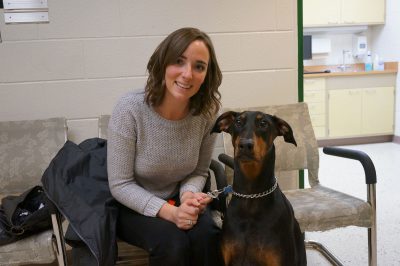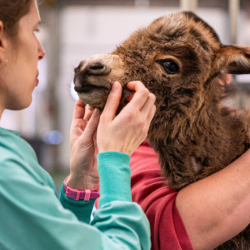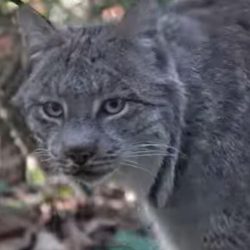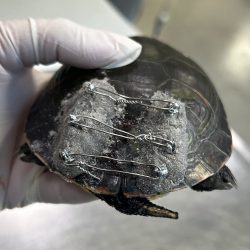
When senior veterinary student Jennifer Barczak was on an ER rotation in Arizona, she received a call from a classmate about a charming nine-week-old Doberman Pincher that arrived at the MSU Veterinary Medical Center from a rescue group.
Barczack had been looking for a puppy to adopt, and this quirky little Doberman was just what she was looking for. Visually, the puppy didn’t have any noticeable defining features besides a minor under bite. What brought her to the Hospital was a serious heart condition. After hearing more of the puppy’s story from the doctors and the rescue group, Jennifer decided to help.
Jennifer named her Allie. Allie was born with heart conditions called pulmonic stenosis and ventrical septal defect. In other words, she had a thickened valve in her heart along with a hole between two of the chambers. The first condition wouldn’t allow the pressure inside her heart to get high enough to pump blood to the rest of her body, so her growth was stunted and she was frequently short of breath. The hole between the heart valves created a heart murmur so acute that the average person could feel it through her fur.
Unfortunately, without care and a potential adoptive family, euthanasia may have been Allie’s only option since it is often difficult to find homes for rescue animals with special needs. Luckily, the rescue group brought Allie to the MSU Veterinary Medical Center for treatment and Jennifer was able to secure financial help for her surgery.
“I wanted to do something to help out,” said Barczak. “Up front, I definitely wasn’t able to afford it.”
Enter Refurbished Pets of Southern Michigan and Special Needs Dobermans, who both promised to contribute toward Allie’s surgery.
“They both went above and beyond,” said Barczak. “They both promised to raise a certain sum, and they both exceeded their goal. I’m thankful they helped out.”
Dr. Robert Sanders, a cardiology specialist at MSU, was Allie’s surgeon. Sanders, an expert in minimally invasive cardiac procedures, inserted a balloon catheter in Allie’s heart to stretch the thickened valve. By doing so, he drastically improved the pressures inside her heart. However, he was unable to repair the hole.
At first, Sanders and Barczak were worried that Allie’s condition, even post-surgery, would get in the way of Allie living a normal life. After a thorough discussion, the two concluded that Allie had to live her life normally.
“I always joke that there’s not an expiration date on the bottom of a dog where we can look and see how we’ve changed it,” said Sanders. “But I think we’ve significantly improved her life span.”
Three years after her surgery, Allie is in good condition. The balloon procedure, called a valvioplasty, dramatically improved her quality of life. Even with the hole between her valves, Allie gets along fine since her body has learned to compensate for her condition. She comes in each year for a check-up with Sanders who conducts an ultrasound and checks her heart pressures.
Like most Dobermans, Allie is playful and boisterous. She enjoys playing, frolicking, and chasing things with her favorite dog housemate, Jade. She still maintains a laid-back personality.
“She’s a dog, and she needs to be a dog,” Barczak said. “Without the surgery she wouldn’t have had a chance at life.”
To learn more about minimally invasive procedures for cardiac conditions, please contact the MSU Veterinary Medical Center Small Animal Hospital at 517-353-5420.



